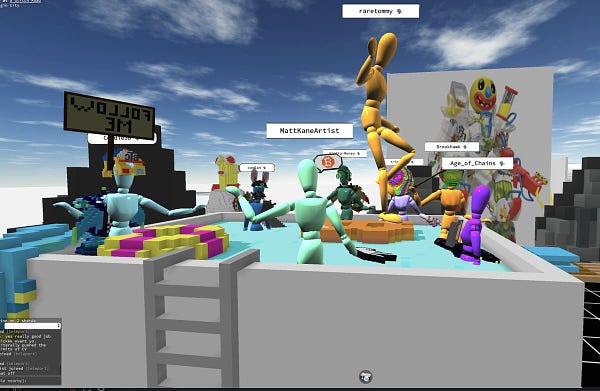💎🕸🖥 The Scarce Web

Metaverse: A persistent virtual environment where users can live, work, and play.
Neal Stephenson, the author of “Snowcrash,” said that the metaverse is the natural evolution of the Internet. While I agree, I believe a true metaverse is only possible with blockchain technology, or more broadly distributed ledger technology. A web evolution was not possible before blockchain technology because users had zero property rights and were unable to truly own their digital assets. Because of this, users were not investing the time and money needed to create a true and thriving metaverse. Digital scarcity is another paradigm shift that blockchain has brought to the web. The Internet, as we know it today, is essentially limitless. Anyone can create thousands of websites, make unlimited social media profiles, and share images, texts, files, etc. Now, I believe we are entering the era of the scarce web.
The scarce web, as the name suggests, is a “limited area” on the Internet where things are unable to be duplicated at will. Today's best examples of the scarce web are blockchain-based virtual worlds, such as Decentraland, Cryptovoxels, Somnium Space, and The Sandbox. When I use the term “scarce web platforms” in this blog I am referring to blockchain-based virtual worlds. Perhaps in the future, there will be even better examples of scarce web platforms than just blockchain-based virtual worlds but for now, that is the definition I am using. To explain further, these virtual worlds sell plots of land for users to build anything they’d like. Users can build a social media profile where they link their photos and post their bio, or they can even create an e-commerce store. Virtual worlds are simply a 3D version of a website with the added features of native monetization and scarcity.
Scarce Web Platforms As Hyper-Dense Cities

Blockchain-based virtual worlds, aka scarce web platforms, will create hyperdense, content-rich areas on the web. Let's use an analogy that compares the GDP growth of cities and rural areas. New York City, with a population of roughly 8.6 million people, is a hyperdense city that has every type of activity available to residents. Topeka, Kansas has a population of roughly 125,000 people and has comparatively much fewer activity options. New York City contributes massively to GDP, adding a reported $1.7 trillion to the United States economy. GDP figures for Topeka are hard to obtain, but we can safely assume they are orders of magnitude less than New York City. We can equate the Internet to the vast United States: think of the small cities and towns as websites. Most websites have a few things you can do, like play a game or read an article, but things to do and economic activity is limited, just like it is in most of America’s small towns and cities. A scarce web platform is more akin to New York City, where people can practically do anything and the economic activity is immense.
Scarce web platforms will be the “cities” of the Internet. Not only will they physically look like cities since people can buy and develop virtual land, but also their economic activity and content within one area will be immense.
The Power Of Scarce Web Platforms
Innovation
Now that we have our city analogy firmly rooted, let's imagine NYC suddenly lifted every building and business regulation. In this hypothetical example, we would see the pace of innovation skyrocket. Property is too expensive? Let’s build tons of low-cost housing. Subway is taking too long? Let’s allow helicopters to fly everywhere. With software, the pace of innovation increases to lightspeed. People do not need to deal with mounds of regulation, have billions of dollars, or even deal with physical limitations. They only need to deal with the 1s and 0s of a computer. It is because of software that these platforms can evolve at an extremely rapid pace and by virtue of this fast pace, constantly evolve to develop rich content.
Consider this example. A user buys a piece of land in a virtual world and builds a house. After the population of the virtual world grows another user comes along and thinks, “That house is at a great location. If I buy it and build a mini-game then I could earn revenue from the land.” So, the user buys it and creates something more content-rich. Instead of a house, it is now a piece of content that users can interact with while earning the builder money. If the experience is not fun then no one will play and the builder will have to build something better or perhaps sell it. The builder might sell it because if it's in a popular neighborhood, people will keep offering to buy the land because the new buyer thinks that they can build something and earn a profit. Of course, the owner could just sit on the property and not do anything with it but eventually, they will receive an offer that they simply can't pass up and sell it to someone who will utilize it more effectively. Scarce web platforms will have this constant push towards optimal utilization because the cost of building is so minimal. If you can code then the development cost is just time plus the initial cost of land.
Marketing


Cryptovoxel users hang out in a virtual hot tub and chat.
Marketing is another massive strength of scarce web platforms. In the future, these platforms will be built, owned, and governed by their users. Not only will people enjoy showing off their creations to others, but also they will have a direct monetary incentive to drive more people to the platform and thus will market it constantly. Having users in charge of creating content is optimal because a team of game developers will never be able to create more content than a group of 100,000 users. As more people enter these platforms and create better content, the marketing will advance and become more sophisticated. Marketing online is cheap and easy, so even the marketing component of scarce web platforms will have a constant push towards innovation.
Features Of A Scarce Web
The scarce web platforms that we have today are not dense in terms of information and entertainment. They are simply too young to host enough games, activities, and information for users to find them more valuable than platforms like Reddit. Reddit is a website that hosts an extremely large number of communities based on people's interests. Reddit has a community for everyone, from space enthusiasts to people who love pictures of cute animals. The point of Reddit is to provide users a place on the Internet where there is a hyper-dense amount of information on specific subjects. Similarly, scare web platforms are already becoming a localized hub for various subjects. For example, the blockchain-based virtual world Cryptovoxels has become an information-dense community for crypto art. I see scarce web platforms becoming a platform like Reddit, except with additional and expanded features focusing on:
Socialization: Scarce web users can talk directly to one another over voice message or world chat to discuss their interests. On Reddit, you can comment on posts and direct message users, but it's more akin to email versus an open chat room type of environment.
Creativity: Scarce web users can build any sort of structures they want within a virtual world. Reddit does not allow any sort of creative building. In Reddit, you can create your own subreddit (community), but you can only choose small customizations, like banner images.
Gaming: Scarce web users can play and create games within virtual worlds. It is not possible to directly play games on Reddit.
Monetization: Scarce web users have uncensorable, native monetization built directly into the core of their platforms. Blockchains like Ethereum cannot stop market activity from occurring once users have possession of their own digital assets. This is not possible on Reddit.
Creating Balance On The Scarce Web
Scarce web platforms will have to find a balance between affordability for users and an increase in land value. If land value is too high new users will not join, but if land value does not increase then it likely means users are not contributing to a content-rich environment. Also, if a specific platform becomes too expensive then new users will be unable to contribute and participate. If there is not a good balance of affordability and content richness then users will exit, meaning they will find another platform.
Exit costs are so low in scarce web platforms that it is crucial they find this balance. Exit costs are exceptionally high in the physical world: leaving a job or moving to a new city is an arduous process that requires time and effort. But unlike physical cities, no such constraints exist for the digital world. If someone dislikes something in the digital realm, they can relocate to a different area on the web with a simple click of their mouse. If users enter a scarce web platform and it doesn't have the content they are looking for, they will surely find another platform.
I would like to caveat this by saying that there are not many current options for users to relocate to other scarce web platforms, but if there is demand for a new, cheaper world to be built then it will happen. The costs for doing so are so minimal that I expect to see thousands of scarce web platforms created over the coming years. Luckily, as explained before, these are internet-native worlds and they can innovate at the pace of software: very, very quickly.
Evolution In The Web
In our age of information abundance where people can surf the web until literal eternity, scarce web platforms offer an evolution. Users will have to put skin in the game by owning a piece of the scarce web platform and developing it, while maintaining a balance between affordability and land value. These interesting dynamics will lead to a content-rich virtual environment, similar to a community on Reddit but with many added features. The ability for users to easily exit means users must build something exceptional or another user will believe they can make something incredible and offer to buy it from them. (I should always caveat this point by saying that having offers from someone to buy your piece of land is highly dependent on that scarce web platform being popular and having a fast-growing population.) The innovation will be constant and drive a fast evolution on these platforms. I am looking forward to seeing the emergence and progress of the scarce web.


